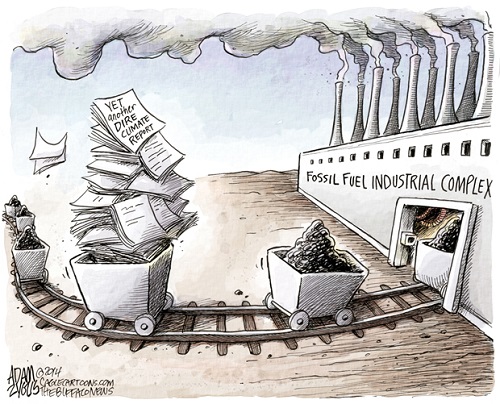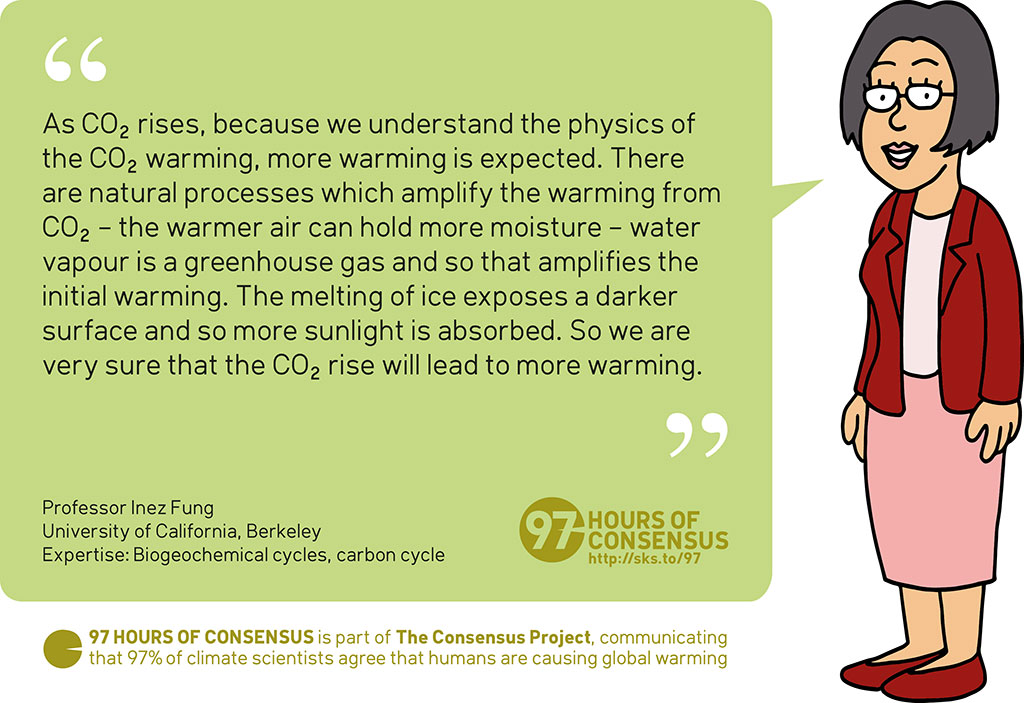2015 SkS Weekly Digest #28
Posted on 12 July 2015 by John Hartz
SkS Highlights
Dana's Climate denial linked to conspiratorial thinking in new study proves once again that an article with both "climate denial" and "conspiratorial thinking" in the title will generate a lot of commentary. The subject matter is definitely a hot button issue. If you have not done so already, you will want to check out Dana 's post.
Also check out the new He Said What? section of the Digest.
El Niño Watch
Is a strong El Niño on the horizon? Forecasters say count on it by Veronica Rocha, Los Angeles Times, July 11, 2015
Toon of the Week

Hat tip to Union of Concerned Scientists
Quote of the Week

The recent rapid declines in bumblebee populations in North America and Europe are linked strongly to climate change, researchers found.
The scientists behind the study are calling it the most comprehensive look yet at the relationship between bee populations and climate change. It was published Thursday in the journal Science.
Researchers at Canadian and American universities said that bumblebee populations are shrinking from the south and are not gaining the same area to the north, unlike what other smaller-scale research has concluded.
“Pollinators are vital for food security and our economy, and widespread losses due to climate change will diminish both,” Jeremy Kerr, the lead researcher and a biology professor at the University of Ottawa, said in a statement.
“We need to figure out how we can improve the outlook for pollinators on continental scales,” he said. “But the most important thing we can do is begin to take serious action to reduce the rate of climate change.”
Bees have lost about 300 kilometers, or 186 miles, of their range from the south, Kerr said.
“The scale and pace of these losses are unprecedented,” he continued.
Study links bee declines to climate change by Timothy Cama, The Hill, July 9, 2015
He Said What?
A directive banning the Clean Energy Finance Corporation (CEFC) from investing in existing wind technology will also apply to small-scale solar projects, a move that will effectively throttle the industry, the Australian Solar Council said.
The federal government on Sunday confirmed that the $10bn CEFC will no longer invest in wind power, instead focussing on “emerging technologies”.
“It is our policy to abolish the Clean Energy Finance Corporation because we think that if the projects stack up economically, there’s no reason why they can’t be supported in the usual way,” Abbott told reporters in Darwin. “But while the CEFC exists, what we believe it should be doing is investing in new and emerging technologies – certainly not existing windfarms.
“This is a government which supports renewables, but obviously we want to support renewables at the same time as reducing the upward pressure on power prices,” the prime minister said. “We want to keep power prices as low as possible, consistent with a strong renewables sector.” [Our bold.]
SkS in the News
In the Coral Bleaching section of his World.Mic article, 8 Photos Capture the Damage Climate Change is Already Doing to the World, Tom McKay states:
Skeptical Science reports that approximately 1% of the world's coral is dying off each year, with warmer oceans playing a huge role in the process. Warmer ocean temperatures stress corals, causing them to eject symbiotic algae crucial for their survival. While recent research has suggested corals may be able to adapt to hotter oceans in the long run, reefs are dying at unprecedented rates.
SkS Spotlights
Australia's Clean Energy Finance Corporation (CEFC) invests using a commercial approach to overcome market barriers and mobilise investment in renewable energy, energy efficiency and low emissions technologies.
As at 30 June 2014, the CEFC had contracted investments of over $900 million in projects with a total value of over $3 billion.
The CEFC invests for a positive financial return, with its more than 40 direct investments and 25 projects co-financed under aggregation programs expected to achieve a positive net benefit for the taxpayer. These projects help to improve energy productivity for businesses across Australia, develop local industries and generate new employment opportunities.
The CEFC operates under the Clean Energy Finance Corporation Act 2012.
Coming Soon on SkS
- Guest Post (John Abraham)
- A hard deadline: We must stop building new carbon infrastructure by 2018 (Stephen Leahy)
- Are we in the midst of a climate action snowball effect? (Dana)
- Dutch government ordered to cut carbon emissions in landmark ruling (Arthur Neslen)
- The most influential climate change papers of all time (Roz Pidcock)
- 2015 SkS Weekly Digest #29 (John Hartz)
Poster of the Week

SkS Week in Review
- 2015 SkS Weekly News Roundup: End of the Series by John Hartz
- Who knows what about the polar regions? Polar facts in the age of polarization by Lawrence Hamilton
- 2015 SkS Weekly News Roundup #28A by John Hartz
- Global Commission Finds Economic Growth Can Close the Emissions Gap by WRI
- Climate denial linked to conspiratorial thinking in new study by Dana
- Carbon cycle feedbacks and the worst-case greenhouse gas pathway by Andy Skuce
- Announcing the Uncertainty Handbook by Adam Corner
- 2015 SkS Weekly Digest #27 by John Hartz
97 Hours of Consensus: Inez Fung
































 Arguments
Arguments






























Climate change: NSW Farmers Association changes policy, calls for fossil fuels transition
Of particular note, apart from the fact that ruling NLP party in Australia, with science denying PM Tony Abbott, are becoming increasingly alienated from reality, is this particular passage:
Interesting that the denying clauses are as new as 2008, when the denial movement started at the leading to COP 2009. The abolishment of this dnial among farmers is very welcome. Note that this region of NSW hold strong support for National Party which is the ruling party. Due to the changes going on here, I expect the ruling party to change their stance or face diminishing support at the next election.
El Nino effecting California? Could be. They could do something about it. Get a book called Three Against the Wilderness by Eric Collier. It describes at least a partial solution for California. To my mind it is as significant book as Silent Spring by Rachel Carson, Feral by George Monbiot or Never Cry Wolf by Farley Mowatt. It is too late for this El Nino but with an effort it could mitigate the effects of the next one and more and more as the years go by.
william@2,
This is a very bold statement comparing your book to such classics. Without a single word about the book - even without an explanation of what it is about - your assertion amounts to meaningless trolling, which is not compatible with this website.
Please explain what your book is about, why in your opinion it should be valued as all time env classic and in particular how it relates to climate science or "El Nino in California". Otherwise, I conclude your comment be off topic trolling. Even in an open thread as this one, all comments should be climate science related, and ideally "Explaining climate change science & rebutting global warming misinformation" per the motto on the home page.
[PS] I think this comment is needlessly hostile and perhaps a few minutes on google would have helped. The book is a classic and I guess the poster thinks that the rehabilitation of a drought-striken 1930s landscape could by applicable.